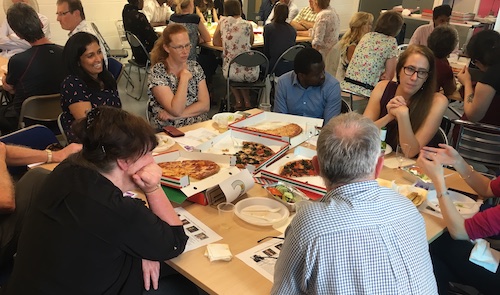Invisible Cities Ideas Cafe
As part of the QBP symposium, Irene Steffanini organised an Ideas Cafe on the invisible world of microbes. 30 members of the public came to the Kenilworth Centre to listen to speakers from the University of Warwick and further afield talk about their research on microbial science. Topics discussed included antibiotic resistance and why it is important to finish a course of antibiotics, how bacterial communities are like a soap-opera complete with lies and cheating, and the impact drugs can have on our gut bacteria. Every person rated the event as good or excellent and most people said they found the evening interesting and that the table discussions were great, with the speakers being able to explain their research in an understandable manner. It was great to receive such good feedback and we're glad the audience and speakers enjoyed the evening!

Some feedback included:
"Just got home from the ‘Invisible Cities’ evening and I wanted to say thank you to everyone involved in setting this up. It was a fascinating evening and a privilege to listen to and then discuss with academics who are at the forefront of their fields. I feel very lucky to have been able to attend this evening"
"very interesting, thought provoking and helping to understand where new knowledge is being found"
And from our speakers:
"It was a joy, the audience came up with great questions and a lot of insightful comments"
What is an Ideas Cafe?
Ideas cafes are a way for academics to engage in a fun and meaningful way with the general public. The general format of the event is relatively simple. each speaker presents for no more than 5 minutes, giving an overview of their research and presenting discussion points to the audience. They then join the audience in a round table discussion about the discussion points, or whatever tangent the discussion moves on, dependant on the interests of the table. After 20 minutes or so the speakers move to the next table. This is repeated until each table has had the chance to speak to each researcher. These events are typically broken up with food and drink breaks, to allow for more informal discussions over food.
Speakers

Prof. Avigdor Eldar – Tel-Aviv University, Israel
Bacterial soap-opera: communication, manipulation and cheating in the bacterial world
The Eldar lab is studying how bacteria communicate, their social behaviors and potential implication for pathogenic bacteria.

Dr. Kiran Patil – EMBL, Germany
Drugs: it takes guts (bacteria)
Kiran spoke about how therapeutic drugs impact our gut bacteria and how in turn the bacteria can modulate drug efficacy.

Prof Kendra Rumbaugh – Texas Tech. University, USA
Combatting multidrug resistance bacteria
Bacterial resistance to current antibiotics is increasing at an alarming rate and few new drugs are in the developmental pipeline. Clearly there must be a multi-faceted approach, which includes more prudent use of antibiotics and improved strategies for discovery and development, if we are to solve this problem.

Dr. Kalesh Sasidharan – University of Warwick, UK
MicrobeMeter
Growth of microbes can either be a good thing (yeast in beer) or a bad thing (bacteria causing infection). Cost-effective biological measurement devices are useful for both professional as well as citizen scientists. Kalesh demonstrated one such device that we have made, named MicrobeMeter, which can precisely measure the growth of microbes over long periods of time.

Dr. Arnaud Kengmo Tchoupa – University of Warwick, UK
How does MRSA (methicillin-resistant Staphylococcus aureus) survive in a HOSTile environment?
With the rise of antibiotic resistance in the vast majority of pathogenic bacteria, it is of prime importance to understand how they survive and thrive within their human host. Research to dissect how the nasty bacteria escape both conventional antibiotic treatment and host defence responses will help us to develop new tools to find and kill them.

Dr. Jan-Ulrich Kreft - University of Birmingham, UK
The weird and wonderful Bdellovibrio
Jan introduced Bdellovibrio – a bacterium that is a predator of other bacteria – and share some surprising results with you. Learn why being too good at hunting and having a well-fed supply of prey is not necessarily a good thing for the predator!
